Undocumented Chinese Immigrants Driven Further into Invisibility
The story was co-published with World Journal as part of the 2025 Ethnic Media Collaborative, Healing California.
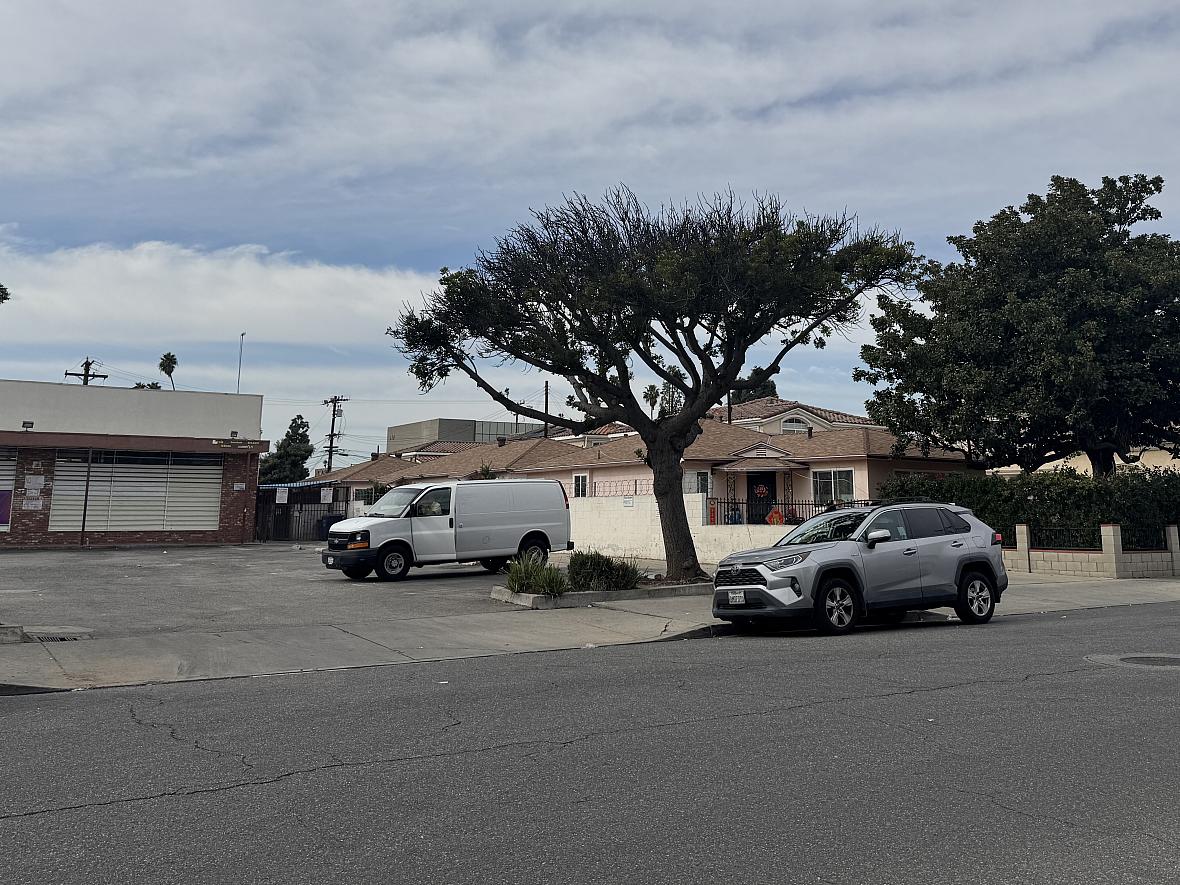
Fatty Ding Square in Monterey Park, shot in February 2025. (Photo by Jian Zhao/World Journal)
Fatty Ding Square in Monterey Park has long been a landing spot for migrants from China. New arrivals can readily find “family hotels” for less than $20 per night, employment agencies offering day labor without work permit requirements, legal assistance for asylum applicants, and convenient access to Chinese restaurants nearby.
However, these days, the square is much quieter. During recent visits, there were few people at the square who were willing to take the risk of meeting at the gathering spot.
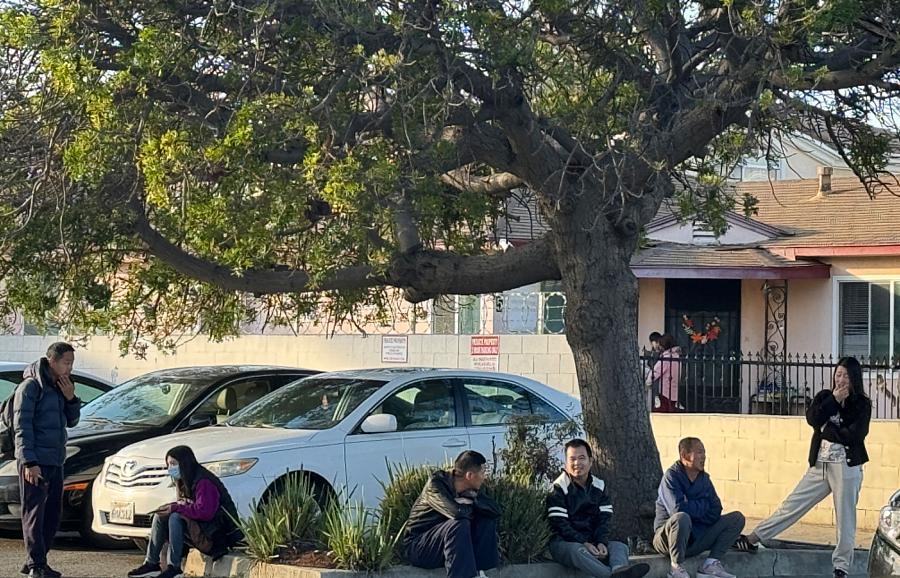
Fatty Ding Square in Monterey Park, taken on February 2024. (Photo by Jian Zhao/World Journal)
A staff member from a nearby agency, “Service Center for Rùn Folks ”, who requested anonymity to protect his identity said that while there haven’t been any ICE raids or arrests spotted here, people are still on edge, their worries fueled by rumors about arrest targets and locations. A grocer in the square confirmed that there have been far fewer people here since January, and the food stalls that once lined the square are now gone.
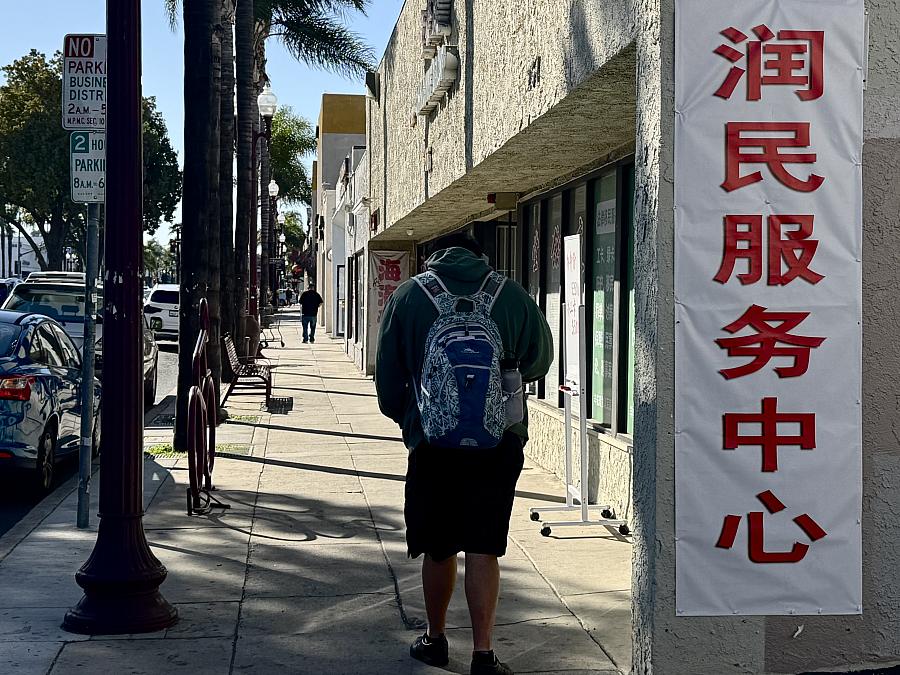
Service Center for “Rùn Folks” near Fatty Ding Square in Monterey Park. In Chinese, "Rùn"(润, the first of the vertical red characters in the photo ) is a homophone of the English word "run," symbolizing emigration abroad while circumventing government keyword detection.
(Photo by Jian Zhao/World Journal)
A food bank distribution event at Barnes Park in Monterey Park also saw fewer people show up. The location has long served as a vital support for low-income seniors and undocumented individuals struggling to find employment. Regular food recipients said there used to be a long line at the event. Some elderly residents living in nearby “family hotels” have stopped attending since January.
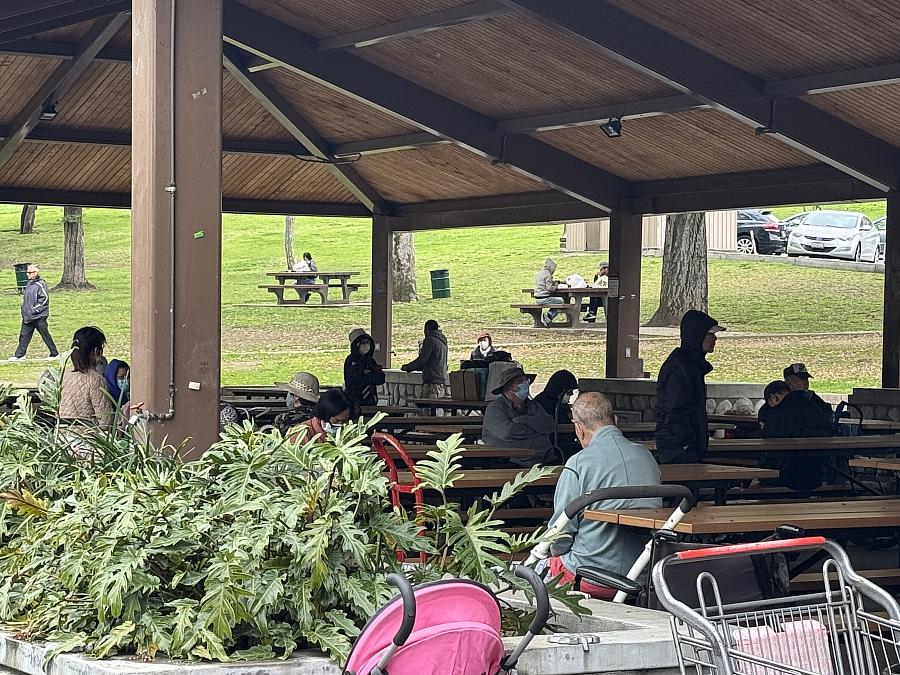
Food bank distribution event at Barnes Park in Monterey Park on March 11. (Photo by Jian Zhao/World Journal)
Food bank distribution event at Barnes Park in Monterey Park on March 11. (Photo by Jian Zhao/World Journal)
Rumors and misinformation about immigration raids have driven many who have arrived in the country without valid documentation, into the shadows, including increasing student absenteeism. Immigration attorneys and advocacy groups are experiencing a surge in requests, likely due to increased immigration-related activity, and a heightened need for legal guidance.
"Since Trump took office, the demand for immigration-related legal inquiries has increased significantly, with daily inquiries from many, including those who have lived in the U.S. for many years, with families, children, and established careers or businesses. If they are deported, the impact on their families would be devastating," said David Liu, a 20-year litigation attorney in the San Gabriel Valley. "To avoid the risk of arrests, some have chosen to stay indoors entirely."
The San Gabriel Valley is home to a large and vibrant Asian population (58% - 22K), with over 50,000 undocumented Asian Americans among this group,, according to Americans Advancing Justice Southern California (AJSOCAL)’s estimates.
Liu said that some individuals are unaware they could be detained by ICE. “They thought they were no longer undocumented because all their familiy members are U.S. citizens and they’ve lived here for decades.”
Amid growing fears and uncertainty over government immigration policies, 79-year-old Chinese immigrant Lily Li, who has lived in the U.S. for 18 years without authorized status, said that finding work has become more and more difficult. She’s been unemployed since the end of last year and now relies on food assistance, sharing a $450 rent for a single bedroom with two others.
Unable to bear the stress anymore, she has decided to leave. "I don't want to stay in the U.S. anymore.Once I find a job and save enough for the trip, I’m leaving," she said..
Erratic Law Enforcement Practices
William Kiang, who brings 30 years of expertise as an immigration attorney and former employee of the United States Immigration and Naturalization Service (now USCIS), contends that despite the Trump administration's claim that deportation primarily targeted immigrants with criminal records and those with deportation orders, in reality, wrongful arrests and deportations occur due to a lack of full understanding of each individual's background and legal complexities.
Kiang has recently taken on a surge of immigration cases, with many Chinese immigrants deeply worried about their status. "In the past, I would have considered many of these concerns to be overblown, but the situation has changed. Now, anyone without confirmed legal status could be at risk of arrest."
Among the cases Kiang has handled, some individuals are facing a difficult dilemma. “Despite having no criminal record, holding valid work permits, and regularly checking in with immigration authorities, they are now unsure whether they should" continue attending their routine check-ins.”
"One of them, who has been undergoing hemodialysis, used to apply for a stay of removal each year, which temporarily postponed his deportation. But this year, after being required to check in with immigration authorities, he was detained," Kiang said.
“Confusion and fear of arrests and deportation are the increasing concerns that we heard from the immigrant communities,” said Connie Chung Joe, CEO of Asian Americans Advancing Justice Southern California (AJSOCAL), a civil rights organization actively involved in providing legal assistance to Asian immigrants. In the San Gabriel Valley, over half the population is foreign born.
“Communities that are at higher risk of ICE immigration enforcement activities could be the undocumented with criminal activity or charges, someone with an outstanding removal order or ordered to be removed but never left, and recent arrivals from the southern border who are primarily asylum seekers,” Joe said.
Policy Changes
The fear in the Chinese speaking community comes from policy changes.
President Trump has signed a series of executive orders aimed at dramatically reshaping U.S. immigration policy. In the administration's first 50 days, Immigration and Customs Enforcement (ICE) arrested over 33,242 migrants living in the United States without legal status, according to officials. That’s still behind the target of 1,200 to 1,500 arrests daily, as reported by The Washington Post.
The arrests and detentions of undocumented immigrants have followed no clear guidelines, according to government officials, lawyers and community leaders. ICE did not respond to email inquiries seeking clarification on their arrest targets and immigration enforcement practices.
In a post on X on January 26, a day after President Trump was inaugurated, ICE reported that agents had made 956 arrests in a single day. But an NBC report later found that immigration authorities had close to 1,200 arrests that day, with nearly 52% considered “criminal arrests.” Reports indicate a troubling trend of unauthorized immigrants with no criminal history being detained and facing deportation.
Rising Student Absenteism
“There have been some students with a decrease in daily attendance during the month after January 20, 2025, as compared to the previous two years’ baseline data,” shared spokeswoman Natalie Tee Gaither for Alhambra Unified School District which has a student body that is half Asian and a third from low-income families.
But in a statement, the district was hesitant to draw a correlation between the new immigration policies and daily attendance.
“The changes in federal policies have understandably caused concerns for some of our students and parents. Site staff members have been reassuring students that they are safe on our campuses and have been redirecting them to available resources and support.”
The district has held meetings to provide employees guidance on what to do if an ICE agent should show up at schools.
Jose Ng, immigrant rights program manager at the nonprofit Chinese for Affirmative Action(CAA), said he has felt the fear and concern from school staff: “We’ve been receiving many calls from teachers worried that ICE is entering schools and arresting children. They’re asking if it’s safer for kids to go to school or take public transit. Teachers are also sharing that some students are very concerned.”
Ng is taking calls for the Rapid Response Network, a local hotline in San Francisco available 24/7 responding to ICE detentions and raids. CAA is partnering with 11 other organizations to connect people who call in to legal services and other support services. They also help verify the immigration enforcement activities and share the latest law enforcement activities with the communities.
"We have seen the fear," Ng added. Most arrests reported through the hotline typically occurred at home. “If it's happening at home, usually the family is around them, the kids might be with them as well.”
Lives Affected
There are about 2.7 million unauthorized people in California, with Asian immigrants being the second-largest group, comprising 16% of the unauthorized population, according to the Migration Policy Institute. The policy changes, media headlines, and social media posts directly affect their everyday lives and those of their families.
The calls to the hotline often come from the family members of those being arrested. “Homes or workplaces are two most common spots,” Ng said.
Ng said that most of the callers were mothers with young children. Some were in tears, while others said they had to take medication to cope with the stress and depression they were dealing with. “The husband usually is the breadwinner for the family.”
“We see a high increase of the individual arrests since (Trump’s second term), about five to seven on a weekly basis right now in San Francisco, compared to one or two cases before. This is only for arrests where someone called us with specific names they are looking for,” Ng said.
According to ICE data analyzed by The New York Times , the number of people booked into detention (not arrests) peaked at 872 per day in late January. This represents a significant rise compared to the previous year under the Biden administration, when the daily average was around 255 people. On ICE's X posts, arrests peaked at 1,179 on January 27. The data also shows that while the number of arrests and detentions have increased, the number of deportations have decreased when compared to last year.
Ng said people were calling to check if it’s safe to go to work, send a kid to school, travel, or even file taxes, etc. “Some called us every single morning to confirm if there were any raids or arrests happening.”
Listing some of the ways people were coping, Ng said that some immigrants might ask friends to pick up their kids so they don’t have to leave the house, others stop attending in-person community events. People also report being let go by the employer because the employer was too afraid of keeping them due to their immigration status,
“The fear is so real, impacting the daily life and the well-being of the family,” he said.
Lack of Due Process
“Most immigrants won't question authority and will comply,” according to CAA Director of Communications Sin Yen Ling, drawing insights from their support programs for the undocumented and their families. She said that although ICE or any law enforcement must present a judicial warrant signed by a judge before entering someone's home, there have been times when they only presented an administrative warrant.
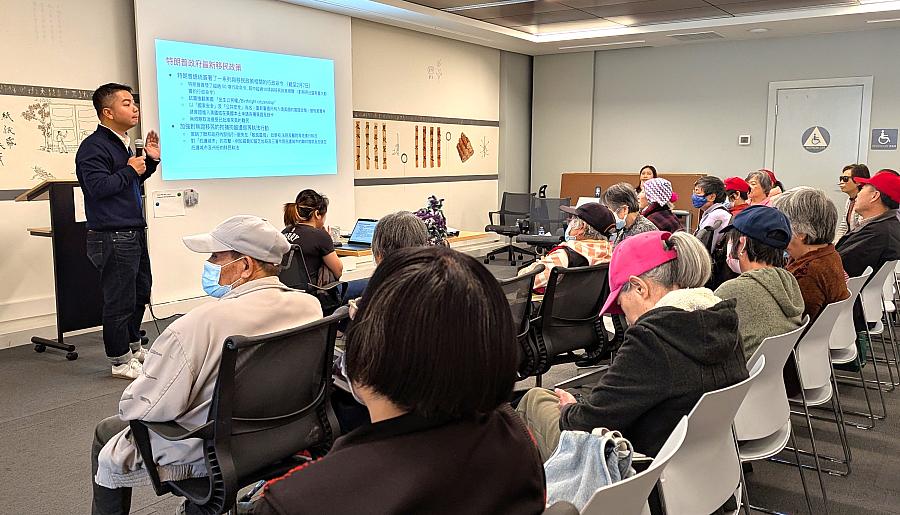
Immigrant Rights Workshop hosted by CAA in San Francisco's Chinatown on February 28. Courtesy of CAA.
“Administrative warrants are easier to obtain because they don't have to be signed by a judge. But administrative warrants do not allow entry into homes or private spaces,” explains Andy Ji, the director of client services of AJSOCAL. “The average immigrant won’t know the difference and they will open their doors.”
AJSOCAL has received calls from the Chinese and Vietnamese communities whose family members have recently been detained by ICE. The lack of language support makes them vulnerable to miscommunications and misunderstandings.
Furthermore, “what is specifically happening in the expedited deportations is that the folks being removed aren't getting their due process,”Ji added.
Planes of AAPI immigrants were deported last month. AJSOCAL issued a press release condemning the deportations without due process: “These rapid removals, conducted under a veil of secrecy, violate fundamental human rights, exacerbate fear in immigrant communities, and echo dark chapters of American history when people of color were forcibly removed and detained without without due process.”
AJSOCAL has called for more transparency, language services and legal representation. As a non-profit legal services provider, AJSOCAL stresses that their responses are not legal advice.
Given the lack of clear and reliable information on the current ICE raids targeting the undocumented, Ng worries about their chilling effect.
“There are all kinds of of rumors, creating a lot of concern, a lot of fear within the community,” Ng said. Rumors, usually shared by social media or friend groups, often claim there were signs of ICE or potential raids at certain places around certain times, but most of them are fake; Other rumors suggest ICE arrests targeti not just the undocumented, but all immigrants, including those with green cards.
To Report ICE Activities
Northern California:
- San Francisco: 415-200-1548
- San Mateo County: 203-666-4472
- Santa Clara County: 408-290-1144
- Alameda County: 510-241-4011
- Santa Barbara/Ventura/San Luis Obispo: 805-870-8855
Southern California:
- Los Angeles: 888-624-4752
- Orange County: 714-881-1558
- San Bernardino/Riverside: 909-361-4588
Central California:
- Central Valley: 559-206-0151
- Kern County: 661-432-2230

